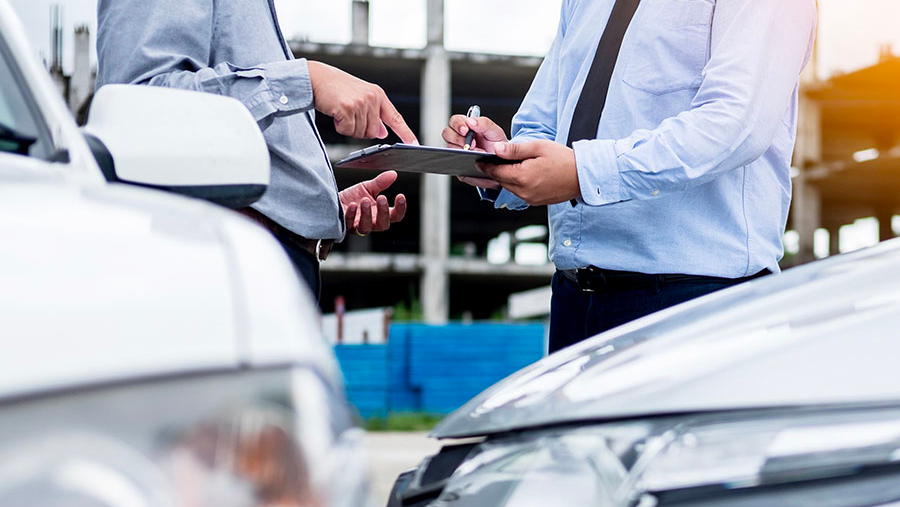
In my 30 years as a personal injury attorney, I’ve witnessed numerous clients grappling with a common post-accident conundrum: whether to notify the other driver’s insurance company. This decision is critical, often shaping the trajectory of an insurance claim. Drawing from my extensive professional experience, I appreciate the weight of such decisions and their potential impact. Together, let’s delve into this topic, armed with insights I’ve gathered over the years, to help you navigate this often complex decision-making process.
After a Vehicular Collision, Who Should I Contact?
After an accident, deciding whether to contact the other driver’s insurance or your own can be perplexing. According to the Arizona Department of Financial Institutions (DIFI), you should first notify the police and then your insurance agent or producer promptly. It’s also advisable not to admit fault or discuss the accident with anyone except your insurer representative, insurance agent, or the police.
Key Takeaways:
- Contact your insurance first: They’re equipped to advise you and manage the claim.
- Avoid admitting fault: Discuss the accident only with your insurer or the police.
- Be cautious: The other driver’s insurance may not have your best interests at heart.
Should I Talk to the Other Party’s Insurance Company?
When it comes to communicating with the other driver’s insurance company, proceed with caution. Their primary goal is to protect their financial interests, not yours. Any information you provide can be used to minimize their payout.
Why It’s Risky to Talk to Other Insurance Companies
Insurance agents are trained to gather information that could reduce their company’s liability. The Arizona Department of Transportation (ADOT) advises caution if an accident occurred and the other driver did not have valid insurance. They suggest submitting an Insurance Information Request along with a police report if needed.
When Not to Speak to the Other Driver’s Insurance Company
Avoid speaking to the other insurance company in these situations:
- Fault is unclear: Any premature statements can be detrimental.
- Injuries are involved: Emotional statements can jeopardize your claim.
- Legal counsel is necessary: Consult with an attorney before engaging in discussions.
When Is It a Good Idea?
Contacting the other party’s insurance directly may be reasonable if liability is clear and no injuries are involved. However, limit your communication to the essentials of filing a claim.
Key Takeaway:
- Minimize communication: Only provide essential information and consult an attorney for detailed discussions.
Advice for Talking With the Other Driver’s Car Insurance Firm
When interacting with the other driver’s insurance, your primary goal is to file the claim. Offer only essential details from the car accident report and avoid extraneous information.
What Should You Say to The Other Driver’s Insurance Company?
When speaking with the other driver’s insurance, stick to the facts. Avoid providing unnecessary details or opinions about the accident. Remember, these calls might be recorded and used in future negotiations or legal proceedings.
Do I Need a Lawyer?
Determining whether to involve a lawyer depends on the complexity and severity of the accident.
When You’re Injured
If injuries are involved, consulting a lawyer is advisable. They can assist with navigating medical bills and lost wages, ensuring you receive fair compensation.
Navigating Complex Waters
In cases with disputed fault or uncooperative insurers, legal expertise can be invaluable. Attorneys can translate complex legal jargon and negotiate effectively on your behalf.
The Value of Silence
Post-accident, it’s often best to limit what you share. Let your lawyer handle communications to avoid any misinterpretation of your words.
Bottom Line
Navigating post-accident insurance communication can be tricky. While notifying the other driver’s insurance company is an option, it’s often safer and more effective to let your own insurer handle these interactions. In complex cases, especially those involving injuries or disputed fault, consulting a lawyer can provide you with the guidance and representation needed to protect your interests.
Remember, each accident is unique and requires a tailored approach. If you’re facing the complexities of an auto accident, the Lamber Goodnow team is here to help. Contact us for expert legal guidance to protect your rights and ensure your family’s safety and peace of mind.
Frequently Asked Questions
Q: Should I contact the other driver’s insurance company after a minor accident with no injuries?
A: In minor accidents where no one is injured and liability seems clear, you might consider directly contacting the other party’s insurance to file a claim. However, it’s often advisable to first discuss the incident with your own insurance provider. They can offer guidance on the best course of action and handle communications on your behalf, reducing the risk of miscommunication or inadvertently admitting fault.
Q: What information should I provide if I do contact the other driver’s insurance?
A: If you decide to contact the other driver’s insurance, limit the information you provide to the essentials: the time, date, and location of the accident, and any relevant details from the police report. Avoid sharing opinions about the accident or discussing fault. Remember, these conversations could be recorded and used in future negotiations or legal proceedings.
Q: If the other driver was clearly at fault, do I still need to notify my insurance?
A: Yes, it’s generally recommended to notify your own insurance company even if the other driver was clearly at fault. Your insurance provider can offer valuable advice and may need to be involved in the claims process, especially if there are later disputes about the accident or the coverage of the other driver is insufficient.
Q: When is it essential to get a lawyer involved after an accident?
A: Consider hiring a lawyer if the accident involved injuries, significant property damage, or if there’s a dispute about who was at fault. A lawyer can help navigate complex legal and insurance issues, ensure that your rights are protected, and work towards securing fair compensation for any damages or injuries sustained.

